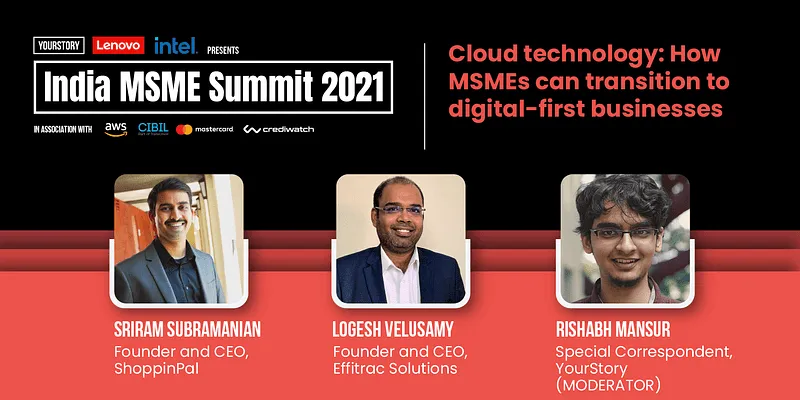[India MSME Summit 2021] Lessons from the cloud: how MSMEs can transition to digital-first businesses
At YourStory’s third annual India MSME Summit, Logesh Velusamy, Founder and CEO, Effitrac Solutions, and Sriram Subramanian, Founder and CEO, ShoppinPal, came together to reveal some of the lessons India’s MSMEs have learned about cloud-based technologies.
Amidst the COVID-19 pandemic, India’s cloud infrastructure market is one of the few sectors that has emerged strong. The market was valued at Rs 30,140 crore in 2020 and is expected to grow at a CAGR of around 29 percent to reach Rs 1,16,923 crore by 2025.
In a video interaction during YourStory’s third annual India MSME Summit, Logesh Velusamy, Founder and CEO, Effitrac Solutions, and Sriram Subramanian, Founder and CEO, ShoppinPal, came together to unpack some of the lessons India’s MSMEs have learned about cloud-based technologies and the advantages they’ve seen by adopting them.
1. Tech helps reduce the number of touchpoints involved
Logesh, who has built an end-to-end business process management solution for MSMEs, explained that cloud technology helps MSMEs reduce the number of touchpoints involved.
He said, “We still live in a physical world where raw materials and goods can’t be moved virtually. Cloud technology doesn’t eliminate the physical world or remove human intervention completely, but reduces the number of touchpoints involved. By doing so, it helps MSMEs reduce their operational expenditures, which is especially important as they recover from the impact of the pandemic.”
His firm, Effitrac, which refers to itself as a SaaS company, offers pre-configured technology packages linked to the size and complexity of the MSME client.
These packages comprise solutions for digital bookkeeping, CRM, and ERP, which address several business aspects, including but not limited to purchasing, production, marketing, invoicing, managing inventory, HR management, customer relations management, and accounting.
These help MSMEs consolidate its processes and rationalise the number of supply chain touchpoints they deal with.

2. Cloud tech can help expand supply chain sources
Like Effitrac, Sriram’s firm ShoppinPal works with a wide range of small businesses on a daily basis. The business has built an MSME-focussed, single-point integration, API management solution for cloud platforms and apps.
Its technology can be deployed by Point of Sale, accounting, ERP, CRM, payment, and other B2B system customers and partners, and offers key integrations and apps for MSMEs at speed and scale.
Sriram explained how leveraging such technology helps MSMEs expand their supply chain sources.
“For instance, if you are an MSME involved in agriculture wholesaling, you can connect and integrate with several agritech startups and companies whose cloud-based solutions can help you work around and solve your supply chain issues. Having multiple options for your supply chain helps reduce dependency on one particular vendor or channel,” he said.

3. Cloud enables MSMEs to focus on core business areas
As entrepreneurs working extensively with MSMEs on a daily basis, Logesh and Sriram said they have seen tech-enabled MSMEs fare better amidst the pandemic. They explained MSMEs have to be handheld through their digital journeys and taken to a stage where an integrated set of apps runs their business on autopilot.
This is relevant as cloud-based technology helps MSMEs focus on their core areas of business rather than spend valuable time and resources on managing in-house IT infrastructure.
Such technology allows delivery of computing services such as servers, storage, software, databases, networking, and analytics to MSME customers over the internet. Thus, the demand for secure, reliable, scalable, and cost efficient technology services has been on the rise, leading to higher cloud adoption and cloud infrastructure spending among MSMEs.
Besides manufacturing and retail, other sectors that have become highly dependent on cloud computing services are e-learning, telemedicine, banking, financial services, and insurance (BFSI).
Edited by Teja Lele


![[India MSME Summit 2021] Lessons from the cloud: how MSMEs can transition to digital-first businesses](https://images.yourstory.com/cs/21/98e25df018b511e988ceff9061f4e5e7/Image1tdb-1624182254129.jpg?mode=crop&crop=faces&ar=2%3A1&format=auto&w=1920&q=75)






